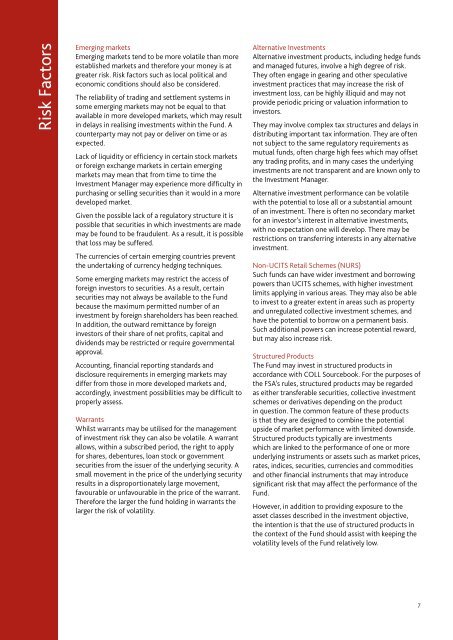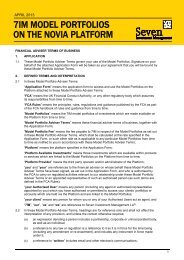CF 7IM Opportunity Funds - Seven Investment Management
CF 7IM Opportunity Funds - Seven Investment Management
CF 7IM Opportunity Funds - Seven Investment Management
You also want an ePaper? Increase the reach of your titles
YUMPU automatically turns print PDFs into web optimized ePapers that Google loves.
Risk Factors<br />
Emerging markets<br />
Emerging markets tend to be more volatile than more<br />
established markets and therefore your money is at<br />
greater risk. Risk factors such as local political and<br />
economic conditions should also be considered.<br />
The reliability of trading and settlement systems in<br />
some emerging markets may not be equal to that<br />
available in more developed markets, which may result<br />
in delays in realising investments within the Fund. A<br />
counterparty may not pay or deliver on time or as<br />
expected.<br />
Lack of liquidity or efficiency in certain stock markets<br />
or foreign exchange markets in certain emerging<br />
markets may mean that from time to time the<br />
<strong>Investment</strong> Manager may experience more difficulty in<br />
purchasing or selling securities than it would in a more<br />
developed market.<br />
Given the possible lack of a regulatory structure it is<br />
possible that securities in which investments are made<br />
may be found to be fraudulent. As a result, it is possible<br />
that loss may be suffered.<br />
The currencies of certain emerging countries prevent<br />
the undertaking of currency hedging techniques.<br />
Some emerging markets may restrict the access of<br />
foreign investors to securities. As a result, certain<br />
securities may not always be available to the Fund<br />
because the maximum permitted number of an<br />
investment by foreign shareholders has been reached.<br />
In addition, the outward remittance by foreign<br />
investors of their share of net profits, capital and<br />
dividends may be restricted or require governmental<br />
approval.<br />
Accounting, financial reporting standards and<br />
disclosure requirements in emerging markets may<br />
differ from those in more developed markets and,<br />
accordingly, investment possibilities may be difficult to<br />
properly assess.<br />
Warrants<br />
Whilst warrants may be utilised for the management<br />
of investment risk they can also be volatile. A warrant<br />
allows, within a subscribed period, the right to apply<br />
for shares, debentures, loan stock or government<br />
securities from the issuer of the underlying security. A<br />
small movement in the price of the underlying security<br />
results in a disproportionately large movement,<br />
favourable or unfavourable in the price of the warrant.<br />
Therefore the larger the fund holding in warrants the<br />
larger the risk of volatility.<br />
Alternative <strong>Investment</strong>s<br />
Alternative investment products, including hedge funds<br />
and managed futures, involve a high degree of risk.<br />
They often engage in gearing and other speculative<br />
investment practices that may increase the risk of<br />
investment loss, can be highly illiquid and may not<br />
provide periodic pricing or valuation information to<br />
investors.<br />
They may involve complex tax structures and delays in<br />
distributing important tax information. They are often<br />
not subject to the same regulatory requirements as<br />
mutual funds, often charge high fees which may offset<br />
any trading profits, and in many cases the underlying<br />
investments are not transparent and are known only to<br />
the <strong>Investment</strong> Manager.<br />
Alternative investment performance can be volatile<br />
with the potential to lose all or a substantial amount<br />
of an investment. There is often no secondary market<br />
for an investor’s interest in alternative investments,<br />
with no expectation one will develop. There may be<br />
restrictions on transferring interests in any alternative<br />
investment.<br />
Non-UCITS Retail Schemes (NURS)<br />
Such funds can have wider investment and borrowing<br />
powers than UCITS schemes, with higher investment<br />
limits applying in various areas. They may also be able<br />
to invest to a greater extent in areas such as property<br />
and unregulated collective investment schemes, and<br />
have the potential to borrow on a permanent basis.<br />
Such additional powers can increase potential reward,<br />
but may also increase risk.<br />
Structured Products<br />
The Fund may invest in structured products in<br />
accordance with COLL Sourcebook. For the purposes of<br />
the FSA’s rules, structured products may be regarded<br />
as either transferable securities, collective investment<br />
schemes or derivatives depending on the product<br />
in question. The common feature of these products<br />
is that they are designed to combine the potential<br />
upside of market performance with limited downside.<br />
Structured products typically are investments<br />
which are linked to the performance of one or more<br />
underlying instruments or assets such as market prices,<br />
rates, indices, securities, currencies and commodities<br />
and other financial instruments that may introduce<br />
significant risk that may affect the performance of the<br />
Fund.<br />
However, in addition to providing exposure to the<br />
asset classes described in the investment objective,<br />
the intention is that the use of structured products in<br />
the context of the Fund should assist with keeping the<br />
volatility levels of the Fund relatively low.<br />
7



